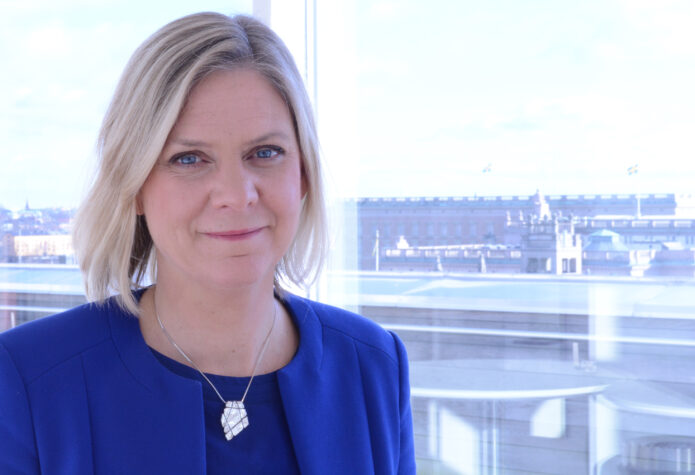Finance Minister of Sweden: Equal economic opportunities drive productivity

“In 2017, the Nordic Investment Bank continued to show that it is an important vehicle for promoting both productivity and sustainability. The recent explicit acknowledgement of equal economic opportunity as a driver of productivity is an important step to maintain the Bank’s relevance”, says Magdalena Andersson, Sweden’s Minister for Finance, who chaired the annual meeting of NIB’s Board of Governors in 2018.
NIB Newsletter asked Ms Andersson to comment on the Bank’s annual results for 2017.
How would you comment on the Bank’s results in 2017?
The Bank had a very successful year 2017, contributing to fulfilling its mandate of promoting productivity and benefitting the environment in the Nordic and Baltic countries. It is very positive that the Bank exceeded its goal of investing 90% of all loans in projects with a “good” or “excellent” mandate rating. However, I regret to see that the share of green projects has gone down. Increasing the number of projects that promote environmental sustainability should be a priority going forward.
Where do you see the most value added by NIB?
NIB has—and will continue to have—an important role to play as a source of long-term financing, both for projects that promote Nordic–Baltic productivity and for those that help build environmentally sustainable economies. NIB should continue to focus on stepping in where the market fails, supporting projects with great benefits to our societies but that find it hard to get financing from the markets.
Sustainability is the core of NIB’s business model. How do you see the relevance of different aspects of it (economic, environmental and social) developing it the future?
It is very clear that there are no alternatives to sustainable development. In light of the increased focus on green investments and the commitments made under the Paris agreement and Agenda 2030, I think that these aspects will be ever more important to NIB’s business model. I very much welcome the important strides that have been made in the last years—for example in the green bond market and regarding wastewater treatment plants, where NIB has been one of the leading actors.
NIB has just revised the way it analyses projects. How does this impact the relevance of NIB?
NIBs added value stems from its ability to circumvent market failures and enable projects that benefit society but that financial markets are unwilling to fund. It is therefore at the core of the Bank’s business model to identify projects that will have positive impacts on either productivity or sustainability, and an updated framework that clearly identifies good projects is crucial for the Bank’s continued relevance.
Equal economic opportunities was added as one new driver for good projects. How do you see the importance of this issue?
I strongly welcome this decision. Equality is a prerequisite for societies to deliver on their full economic potential and thus a natural aspect of promoting productivity. There are many aspects of equal economic opportunities that need to be improved in the Nordic–Baltic region. For example, improving gender equality through increased access to financing for female entrepreneurs is an area where NIB could have a positive impact. It is important that the Bank aims to be a positive influence on equality, both internally and in its external operations.
How should NIB’s member countries support the global agenda for climate and sustainability (COP21, UN SDGs)?
Agenda 2030 and the Paris agreement were milestones for the world and for cooperation on sustainable development. Implementing these goals is a high priority for the Swedish government. In order to live up to the pledges made under Agenda 2030 and the Paris Agreement, vast sustainable investments are required. Here, I believe NIB can play—and is playing—an important role. Sustainable projects in the transport sector, in technical progress and innovation, and in urban infrastructure and green buildings are a few of the categories where I note that NIB projects have contributed to the SDGs.
What is the outlook for the Swedish economy?
We have had very positive development with high growth during the past four years, and the Swedish economy is expected to continue to perform strongly in 2018. The development is driven by increased investments and consumption, as well as by government reforms and an expansionary monetary policy. The high level of activity in the economy is expected to result in a decrease in unemployment, given the reforms so far implemented by the government, to 6.2% in 2018 and 2019. Both employment and the employment rate are expected to continue to rise in these years. After 2018, growth at an average rate is expected.
Where do you see the challenges?
Sweden is a small, open economy and international developments can have a great impact on domestic growth. Globally, we see increased uncertainty related to, for example, Brexit, and signs of increased protectionism. In Sweden, the development of house prices and household debt can affect the domestic economy. A further fall in house prices or rising interest rates may lead to lower growth through reduced housing investments and weaker household consumption. Economic inequality has also increased since the mid-1990s, driven by growing capital income among top income-earners and changes to the tax system. Significant income inequality risks leading to lower growth and increased social problems.